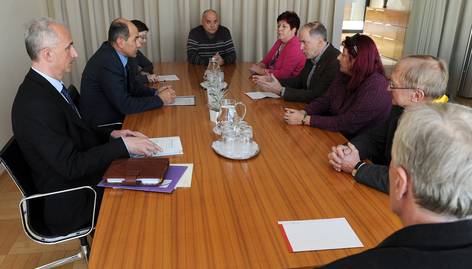NEWS
Prime Minister Janez Janša receives trade union representatives
The Slovenian Prime Minister, Janez Janša, together with the State Secretary, Lovro Lončar, today met with a trade union delegation composed of the President of the Association of Free Trade Unions of Slovenia (ZSSS), Dušan Semolič; the ZSSS Secretary, Milan Utroša; the Executive Secretary of the ZSSS Presidency, Pavle Vrhovec; the Secretary of the Trade Union of Chemical, Non-Metal and Rubber Industries of Slovenia, Sonja Kos; the President of the Trade Union of Public Utilities, Security and Real Estate Workers, Dragica Andlovič; and the President of the Glosa Slovenia Trade Union, Doro Hvalica.
The meeting's participants particularly focused on the measures that would need to be adopted in order to enable Slovenia to overcome the economic and financial crisis. The trade union representatives informed the Prime Minister of the proposal of the European Trade Union Confederation and its members that relates to measures to combat the current crisis.
They pointed out that Slovenia is part of a wider European environment and that certain demands put forward by workers will have to be dealt with at the European level. Moreover, they touched on the forthcoming European Council meeting and addressed certain policies in this regard to raise employment and preserve jobs. The participants agreed that, in seeking relevant solutions, an ongoing social dialogue between the Government and social partners is required. In this regard, they recalled a relatively positive experience during the Government's 2004–2008 term of office.
The Prime Minister drew the attention of his counterparts to the data published today by the Slovenian Statistical Office, which are even more pessimistic than expected. It is a fact that Slovenia is in recession and experiencing negative economic growth; the export growth rate is currently only 2 to 3 per cent, which represents a drastic fall in comparison with the rate recorded at the beginning of the previous year. The starting points for the 2012–2017 Social Contract presented by the Government at Monday's meeting of the Economic and Social Council are based on data that have indicated a better situation. There are no reserves and the work ahead of us will be hard both for the Government and the trade unions, he emphasised.
The trade union representatives responded favourably to the Prime Minister's invitation to participate in the coordination of the new social contract by submitting proposals and alternative solutions.





